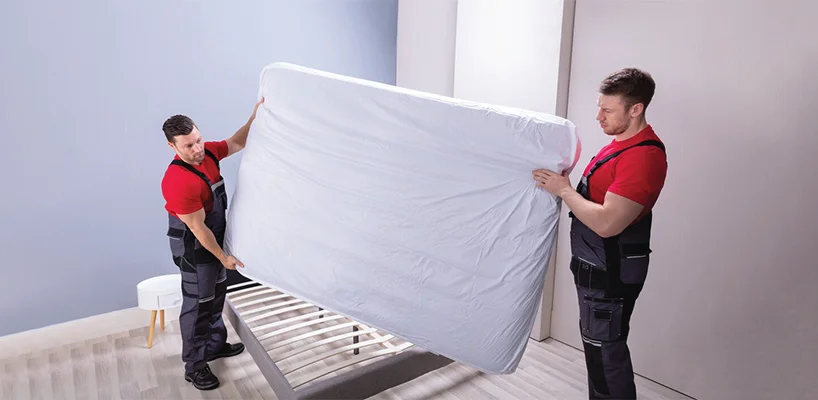Moving a mattress is not just about transporting a bed; it's about ensuring the comfort of dreams arrives safely at its new destination. While the task may seem overwhelming, it doesn't have to be.
With the right approach, you can make the process manageable and safe. We will walk you through the steps to move your mattress smoothly, whether you are changing homes or just rearranging furniture.
From gathering supplies to enlisting help, we will cover everything you need to know to ensure your mattress stays in good shape during the move.
Wondering about the cost of moving a house? Check out “How Much Does It Cost To Move A House?”
Preparing the Mattress for the Move
Preparing the mattress before the move can be quite a task, but it sounds like you are getting organized! Here are some steps you might find helpful:
| Step | Description |
|---|---|
| Clean the Mattress | Vacuum the mattress thoroughly to remove dust and dirt. Spot clean any stains with gentle detergent. |
| Protect with Cover | Use a mattress bag or cover to shield the mattress from dirt and moisture during transit. |
| Measure Your Mattress | Measure the dimensions of your mattress to ensure it fits through doorways and passages. |
| Clear the Path | Remove obstacles and clutter along the route before moving the mattress. |
| Get Help | Get assistance from friends, family, or movers to safely transport the mattress. |

A typical queen-size mattress can weigh between 60 to 90 pounds, while a king-size mattress can exceed 100 pounds.
Essential Equipment Needed to Move a Mattress
Moving a mattress safely requires some essential equipment to protect it from damage and make the process easier. Here's a list of what you'll need:
| Equipment | Use |
|---|---|
| Mattress Bag | Protects mattress from damage, dust, and grime. |
| Dolly or Hand Truck | Makes moving the mattress easier with wheels. |
| Ratchet Tie Down Strap or Nylon Rope | Secures the mattress during transport. |
| Cardboard | Stabilizes flexible mattresses for transport. |
| Tape | Seals the mattress bag to prevent moisture damage. |
| Retractable Knife | Safely opens the mattress bag. |
| Tool Set | Needed for disassembling and reassembling bed frames. |
| Sandwich Bags | Keeps bed frame parts organized and prevents loss. |
Curious to know about moving straps and how to use them? Click here.
DIY vs. Hiring Professionals
Choosing whether to move your mattress yourself or hire professionals comes down to balancing cost and convenience.
Doing it yourself saves money and offers a hands-on experience, but hiring professionals ensures efficiency, safety, and peace of mind.
Let's compare the two:
Curious about your moving costs? Fill out the details, and we’ll calculate them for you.

| Aspect | DIY Moving | Hiring Professionals |
|---|---|---|
| Cost | Lower cost as you only pay for materials and fuel | Higher cost due to professional service fees |
| Convenience | Requires time and effort for packing and moving | Offers convenience with professionals handling the process |
| Control | You have control over the process and timing | Professionals handle the process according to their expertise |
| Risk of Damage | Higher risk of damage if not done carefully | Lower risk of damage with professionals’ experience and tools |
| Time | May take longer, depending on your resources | Faster process as professionals are experienced and equipped |
| Physical Effort | Requires physical labor for lifting and carrying | Less physical effort as professionals handle the heavy lifting. |
| Stress | NCan be stressful, especially for inexperienced movers | Reduced stress as professionals manage the process efficiently. |
| Equipment | You may need to borrow or rent equipment | Professionals come with the necessary tools and equipment. |

Mattresses come in various sizes, with the largest ones measuring up to 76 inches wide and 80 inches long.
Cost Comparison Between DIY and Hiring Professionals
Here's a simple breakdown comparing the costs of a DIY move versus hiring professionals:
| Cost | $80 - $300+ | $300 - $1000+ |
|---|---|---|
| Equipment | $50 - $200+ (rental fees) | Included in service fees |
| Transportation | $20 - $50 (fuel cost) | Included in service fees |
| Labor | Your Time & Effort (no direct cost) | Included in service fees |
| Additional Fees | $100 - $200 (possible damages) | Generally covered under service fees |
| Total Cost | $80 - $300+ | $300 - $1000+ |
Are you confused about how much to tip movers? Click here and remove your confusion.
Steps to Move a Mattress
Every move of a mattress showcases the care people put into their comfort. Let's go through each step thoroughly.
- Put Your Mattress into the Mattress Bag: Invest in a mattress bag to protect it from dirt, moisture, and damage during the move. Slide the mattress into the bag carefully, ensuring it fits snugly.
- Clear the Pathway: Before attempting to move the mattress, ensure the pathway from your bedroom to the vehicle is clear of obstacles. Remove any furniture, rugs, or other items that might hinder the movement.
- Prepare the Transport Vehicle: If you are using a truck or van, make sure it's clean and ready to accommodate the mattress.
- Lift with Care: When lifting the mattress, bend your knees and use your legs rather than your back to avoid strain. Lift the mattress with the help of another person if possible.
- Utilize a Dolly or Hand Truck: If you are moving the mattress over a longer distance, consider using a Dolly or Hand Truck to make the process easier.
- Load the Mattress into the Vehicle: Carefully maneuver the mattress into the transport vehicle, ensuring it remains flat and supported.
- Secure the Mattress for Transit: Use ratchet straps or bungee cords to secure the mattress to the vehicle, preventing it from shifting or sliding during transit.
- Drive Safely: When driving with the mattress, take care to drive slowly and cautiously, especially around corners or over bumps. Avoid sudden stops or sharp turns that could cause the mattress to shift or fall.
Transportation Options
Several options are available for transporting a mattress, depending on the distance, convenience, and resources available.
| Transportation Option | Description |
|---|---|
| Personal Vehicle | If you have a personal vehicle, such as a car, SUV, or truck, you can transport the mattress yourself. |
| Renting a Truck or Van | If you don't have a suitable vehicle, consider renting one from a rental company. Choose a size that accommodates the mattress. |
| Professional Moving Services | Hiring professional movers is advisable for long-distance moves or if you have multiple large items to transport. |
| Public Transportation | Using buses or trains could be an option for smaller mattresses, though it requires careful planning. |
| Shipping | Consider shipping the mattress through a courier or freight service for long-distance transportation. |
Storing a Mattress
Protect your mattress with expert storage methods to prolong its comfort and longevity. These are some of the best ways to store your mattress, whether for the short term or the long term.
Short-Term vs. Long-Term Storage
| Short-Term Storage | Long-Term Storage |
|---|---|
| Typically less than three months. | Generally more than three months. |
| Store in a climate-controlled environment. | Essential to use a climate-controlled storage unit. |
| Mattress can be stored flat or upright. | Store flat to prevent sagging and structural damage. |
| Use a mattress cover for protection. | Use a high-quality, breathable mattress cover. |
Proper Storage Techniques
By following these essential storage tips, you can ensure your mattress remains in excellent condition.
| Proper Storage Techniques | Description |
|---|---|
| Clean the Mattress | Vacuum and spot-clean the mattress, ensuring it's completely dry before storage. |
| Use a Mattress Cover | Protect the mattress with a breathable cover to guard against dirt, moisture, and pests. |
| Store Flat When Possible | Maintain the mattress's shape by storing it flat and avoid placing heavy items on top. |
| Elevate the Mattress | Keep the mattress off the floor using a pallet or other elevated surface to prevent moisture absorption. |
| Climate Control | Use a climate-controlled storage unit to prevent damage from extreme temperatures and humidity. |
| Avoid Plastic Wrap for Long-Term Storage | Use breathable covers instead of plastic to prevent mold and mildew. |
| Regularly Check the Mattress | Periodically inspect the mattress for any signs of moisture or pests. |
Dos and Don’ts of Moving a Mattress
| Dos | Don’ts |
|---|---|
| Measure and plan ahead. | Don’t bend or fold your mattress. |
| Protect your mattress with a cover. | Don’t rush the process and risk injury. |
| Use proper lifting techniques. | Don’t ignore the importance of securing the mattress during transportation. |
Pro Tips for Moving a Mattress
Here are some pro tips for moving a mattress:
- Recruit Help: Mattresses are bulky and often heavy. Enlist the help of at least one other person to make the process safer and more manageable.
- Secure the Mattress: Use ratchet straps or rope to secure the mattress during transport, whether it’s on a roof or in a moving truck.
- Keep the Mattress Upright: Keep the mattress upright whenever possible to maintain its shape and integrity. This also makes it easier to maneuver through doorways and narrow spaces.
- Use a Furniture Dolly: A furniture dolly can make moving the mattress much easier, especially if you have a long distance to cover.
- Protect Your Walls and Floors: When moving the mattress, use moving blankets to protect your walls and floors from scratches or dents.
- Consider Professional Movers: If the mattress is too large, heavy, or difficult to move, consider hiring professional movers who have the experience and equipment to handle the job safely.
- Roll, Don’t Fold: Rolling can be a safer option than folding for memory foam or latex mattresses. Always check the manufacturer's guidelines before rolling or folding the mattress.





